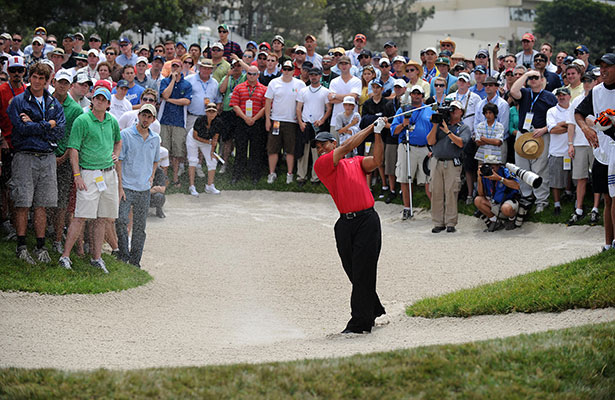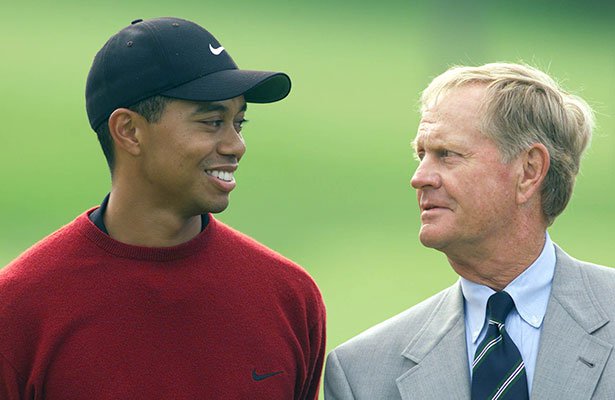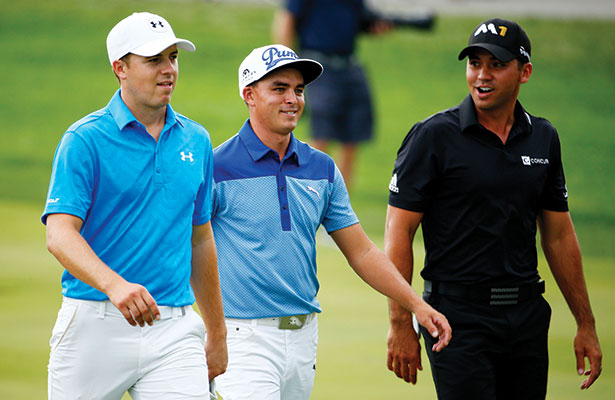On the eve of his 40th birthday, we look back at the career of Tiger Woods to assess whether he really is the greatest of all time.
EVEN when Tiger Woods was dominating the world of golf – when he won seven of 11 Majors between 1999-2002 or four of the eight on offer from 2005 and 2006 – it was difficult to find too many people willing to ordain him as the greatest of all time.
When Tiger wins as many Majors as Jack Nicklaus did, we were told, come back and see us.
In more recent years, it has become increasingly fashionable to write off Tiger’s chances of going past Jack’s record of 18 Major victories, to the point that the ‘greatest of all time’ conversation has all but ended. And there are a number of good reasons for this, not least these three: 1. Tiger has won 14 Majors, but none since the 2008 US Open at Torrey Pines. 2. His various injuries and misadventures have damaged his swing and mindset in ways we we’ll never fully understand. 3. He turns 40 in December, at a time when professional golf is already a young man’s game.
We’ve all but forgotten there was a time when it seemed almost a formality that Tiger would surge past Jack. In June 2008, when Tiger limped off Torrey Pines after beating Rocco Mediate in a dramatic 19-hole US Open playoff, he was celebrating his sixth win in his past 14 Majors, dating back to the 2005 Masters. Tiger described his victory as “probably the greatest tournament I’ve ever played”. Mediate said simply: “He’s so hard to beat. He’s unreal.”

Soon after, Tiger’s good friend Mark O’Meara, the 1998 Masters and British Open champion, told the London Daily Telegraph: “He has a tremendous gift and he takes it to the ultimate high. It’s a God-given thing. People come along in a lifetime, maybe it’s Mozart or maybe it’s Einstein, and get told they can’t do something. They don’t say anything in response. They just keep figuring out ways to do it.”
Not many people have compared Jack Nicklaus to Mozart or Einstein. Sure, in the wake of his defeat of Mediate, Tiger needed knee surgery that would keep him out of the game for months. But he didn’t even need to average a Major victory a year to go past Jack before his 40th birthday on December 30, 2015.
Seven years later, he’s still stuck on 14. Now, the odds of him winning 19 Majors are astronomical. No one has won five Majors after their 40th birthday (the best is Old Tom Morris, who won four British Opens between 1861 and 1867). Only 19 men have won five or more Majors in their careers.
Maybe we should have seen it coming. Jack was 32 when he won the Masters and the US Open in 1972. These were his 10th and 11th Majors. But in winning seven more he was doing what some other great golfers could not.

Arnold Palmer was 32 when he won the Masters and the British Open in 1962. He’d win the Masters again in 1964, his sixth and final Major. Seve Ballesteros was 31 when he won the last of his five Majors. Tom Watson won his last Major at age 33. Peter Thomson won one Major after his 29th birthday. When Greg Norman won his first Major at age 31, we assumed he’d win plenty more – he was extremely fit and as sharp and was about to become the No.1 player in the world. Unfortunately he only had just one more Major in him.
Of course, it is not impossible for 40-somethings to win Majors. There have been three British Open winners in the past five years who were aged in their 40s (Darren Clarke, Ernie Els and Phil Mickelson). And Zach Johnson, this year’s winner, was 39. But a closer examination of the birthdays of recent Major winners suggest these results were aberrations against a trend. Even with the wins of Clarke, Els, Mickelson and Johnson, the average age of Major champions in the past six years is significantly less than in previous decades. Consider the table on page 77.
‘Average age’ is the average age of the 40 Major winners from each decade, and the 24 winners since the 2010 Masters. The number in brackets is the age of the oldest and youngest champions from each decade. It’s hard not to think that the drop in the average age is a sign of things to come. The low figure for the current decade has been forged not just by Jordan Spieth and Rory McIlroy, but also by Jason Day, Charl Schwartzel, Webb Simpson, Keegan Bradley, Louis Oosthuizen and Martin Kaymer.
During the past two years, the average age of Major winners is just 27.5. In the 1980s, when Nicklaus won his final three Majors (two at age 40, one at 46), there were 10 Majors won by golfers in their 20s. There have been 13 Major winners aged between 21 and 29 since the start of 2010.
This is part of what Tiger is up against. The other massive hurdle is his body, which seems increasingly susceptible to injuries. He is not a ‘young 40-year-old’. He was not, we realise now, a ‘young 32-year-old’.
Since the 2008 US Open, either because of missed tournament or missed cuts, Tiger has not played in 36 rounds at Majors. Between the ages of 32 and 39, Nicklaus missed two rounds, when he failed to make the cut at the 1978 US PGA Championship.

Given all the injuries Tiger has suffered over the past 20 years, it’s remarkable he’s actually won as many Majors as he has. It started as early as 1995, when he needed surgery to remove two benign tumours and some scar tissue from his left knee. Six months later, he withdrew from his debut US Open after hurting his wrist. Since then, there has been more surgery on that same knee, a ruptured ACL, cartilage damage, stress fractures in his lower left leg, Achilles tendon damage (in both legs, at different times), a sprained medial ligament, a left elbow strain, a stiff neck and a pinched nerve. Twice, he has needed back surgery, first in April 2014 and again 17 months later. He’ll be spending his 40th birthday next month with his physios.
Part of the Nicklaus legend is that he won two Majors at age 40 and the Masters, famously, at age 46. He did this after a year (1979) in which his form was, to use his own words, “appalling”. Could Tiger do the same?
“When Tiger is healthy, he’s always a force,” Phil Mickelson said recently.
“The impressive thing is that when he struggles, he still finds a way to get around,” Lee Westwood said of Tiger after the 2008 US Open. “That’s what great players do.”
That Tiger was a great player is unquestionable. He doesn’t have to win again to prove that. The greatest ever? His highs (see the accompanying list of Tiger’s 40 defining moments) were greater than anyone else in the history of the game, and that includes Jack. His failure (if that’s the right word) is that by not winning Majors after his 33rd birthday, he hasn’t fulfilled the sky-high expectations we put on him.
Given all his injuries, the weight of history, and the rise of Spieth, McIlroy, Day and company, it would take a special kind of greatness for Tiger to win even one more Major.
If he can somehow achieve that, it might not catapult him to ‘greatest ever’ status, but it would get him mighty close.
| Average Age | Oldest | Youngest | |
| 1960’s | 31.45 | Julius Boros (48) | Jack Nicklaus (22) |
| 1970’s | 31.45 | Gary Player (42) | Seve Ballesteros (22) |
| 1980’s | 32.45 | Jack Nicklaus (46) | Hal Sutton (25) |
| 1990’s | 33.50 | Hale Irwin (45) | Tiger Woods (21) |
| 2000’s | 31.93 | Vijay Singh (41) | Tiger Woods (24) |
| 2010’s | 30.04 | Phil Mickelson (43) | Jordan Spieth (21) |



